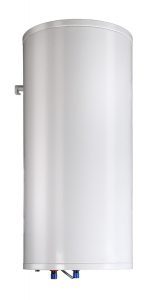 Hard water is unfortunately a common issue in homes today, and it often occurs in cities. Minerals seep down through the ground and into the pipes carrying fresh water from the municipal treatment plants to residential and commercial buildings—this is why hard water can affect homes even with the best city treatment plants.
Hard water is unfortunately a common issue in homes today, and it often occurs in cities. Minerals seep down through the ground and into the pipes carrying fresh water from the municipal treatment plants to residential and commercial buildings—this is why hard water can affect homes even with the best city treatment plants.
The good news is that hard water isn’t dangerous to drink. The concentration of minerals that cause hard water—mostly magnesium and calcium—are found in many foods people eat on a daily basis, and the levels in hard water are not harmful. The problems with hard water show up elsewhere: deposits on fixtures, filmy surfaces on glass, and the difficulty working up soap lather.
But the biggest danger hard water poses is to plumbing and appliances. The household appliance that’s in the greatest danger from hard water is the water heater.
How Hard Water Minerals Hurt a Water Heater
The water heater in your home is an essential appliance. You use it every day, no matter the season, for basic tasks. You want to get the most years of service from one, but hard water can severely cut down on those years.
The source of the trouble is limescale. The heat inside a water heater tank dissolves the minerals from hard water so they form limescale. This can drift to the bottom of the tank and create a sediment layer. The layer between the heat exchanger and the water in the tank makes it harder for the water heater to transfer heat from the burners into the tank. This creates energy waste and cuts down on the efficiency of the water heater. Flushing the tank removes the sediment, but the hard water will cause it to build up again not long after.
But there are worse problems. Limescale will develop along the inside of the water heater’s tank. Because limescale is an insulator, it traps heat inside the tank—more than the tank can handle. This can cause overheating and damage to the system. De-scaling the tank can fix the problem, but it’s only a temporary solution. The hard water must be dealt with at the source.
Tankless water heaters aren’t immune the ravages of hard water! Limescale along the heat exchanger and blocking the pipes can wreck a tankless system in a short time.
The Water Softener
You may need to have your water heater repaired because of damage due to hard water (tank flushing, descaling), but it should be done in combination with the installation of a water softener. This will take care of the hard water problems all around the house, saving the water heater as well as the plumbing.
A water softener works naturally to swap out the hard water minerals for sodium. A water quality professional will find the right type of water heater to meet your needs and attach it to the incoming water line. Contact us to find out more about installation of a water softener in Durham, NC.
Bud Matthews Services is here for all your home service needs in the Durham area.

